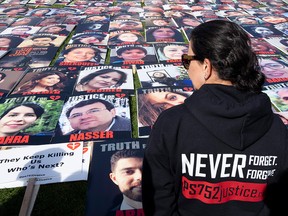An Iranian missile took out airliner carrying dozens of Canadians five years ago this month. Cases are still pending in courts and the UN

Five years after Iran shot down an airliner packed with Canadians, victims’ relatives are still struggling to obtain justice from the country – and may have to wait years longer still.
Flight PS752 crashed on Jan. 8, 2020, minutes after taking off from Tehran’s international airport on its way to Kiev, targeted by two Iranian missiles. The 158 dead included 55 Canadian citizens, 30 permanent residents and dozens more flying back to Canada, via Ukraine, to resume studies.
Meanwhile, lawyers have made no progress in enforcing separate, Ontario court judgments that ordered the Islamic Republic to pay victims $250 million in damages.
And an unusual legal battle between grieving relatives has ended, with a judge fully exonerating their association of allegations of improper conduct.
Despite the drawn-out process of trying to hold Iran to account, the Association of Families of Flight PS752 Victims says it stands by the effort by Canada and other countries to take the Middle-East power to the International Court of Justice (ICJ). The group has launched its own case in the ICJ as well.
“This is a huge feat … to bring the Iranian regime to an international court,” said spokesman Kourosh Doustshenas. “They have done God knows what over the years, so many criminal acts … but they have never been brought to any justice.”
“Nothing can bring our loved ones back. But there are things we can do to seek justice for them.”
However, lawyer Mark Arnold, who handled the Ontario lawsuits on behalf of nine families, questioned whether the United Nations bodies’ deliberations will ever amount to much.
“It is a long, long, long process that rarely does provide justice for people,” he argued.

Meanwhile, Arnold says he’s still haunted by an anonymous phone call he received from Tehran, the caller claiming to be a high-ranking military officer. The man said top Iranian leaders met six hours before the flight and approved its shooting down. The lawyer says he has no way to corroborate the report.
Iranian authorities initially blamed the accident on mechanical failures and began bulldozing the evidence-rich crash site. Under pressure, it eventually admitted the plane was targeted with two air-defence missiles, but called the incident a terrible mistake. Iran had just fired missiles at U.S. military bases in Iraq, and was expecting American retaliation
Some of the Canadian relatives launched a lawsuit in the Ontario Superior Court, winning a “default” judgement – Iran did not mount a defence — that asserted Iran did deliberately target the jet. A later ruling added more plaintiffs, with damages totalling $250 million.
An International co-ordination and response coalition including Canada, Sweden, Ukraine and the United Kingdom, meanwhile, pushed Iran to engage in talks over compensation, demanding reparation, an apology and openness about how exactly the plane met its end. But Tehran refused to negotiate. The coalition finally launched the ICJ case in July of 2023.
It’s a lugubrious process. The coalition submitted its legal brief – called a “memorial” — in October but Iran has a year to respond.
The same coalition has also appealed to the International Civil Aviation Organization (ICAO) – another, Montreal-based UN agency that governs air transport.

It was partly a clash over how to make Iran accountable – by civil courts in Canada it ignores or an international justice system with mixed results – that helped lead to another legal clash two years ago – involving the PS752 Association itself.
In a court application handled by Arnold, the victims who were plaintiffs in the lawsuit against Iran accused the group of mishandling donations, and asked in part that members vote on whether to provide funding to hunt for Iranian assets to seize.
She quoted from an association affidavit: “As expected with a group the size of the Association, all of whom are grieving the senseless loss of a close relative, there can be disagreements and disputes about how best to achieve its purposes.”
Doustshenas said the association racked up nearly $100,000 in legal bills defending against the application and still doesn’t understand why some families decided to take the group to court.
“Instead of joining hands and fighting the Iranian regime, they are doing all sorts of other things.”
Arnold, on the other hand, said he was “taken aback” by the ruling, feeling it was contrary to the evidence presented.
If upheld on appeal, the decision means families could sue for an unlimited amount of damages, not just the set sum that ICAO rules require airlines to pay after any fatal crash.
Our website is the place for the latest breaking news, exclusive scoops, longreads and provocative commentary. Please bookmark nationalpost.com and sign up for our newsletters here.